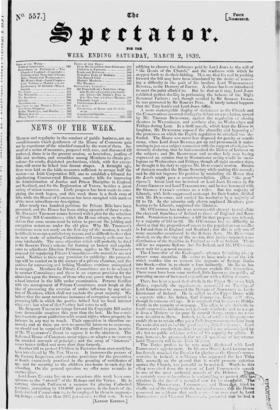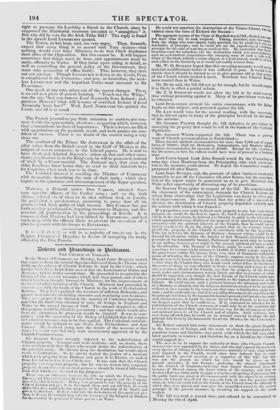NEWS OF THE WEEK.
After nearly two hundred petitions for Private Bills have been presented, and the house has been sitting upwards of three weeks, Mr. POULETT THOMSON comes forward with a plan for the selection of Private Bill Committees ; which the House adopts, on the con- viction that some means must be taken to prevent the jobbing and corruption notorious under the old plan. Why Mr. THOMSON'S resolutions were not ready on the first day of the session, it would he difficult to assign a satistitetory reason, and as difficult to show that tit: new mode of selecting Committees will remedy evils now be- come intolerable. The fialfle objection which will probably be fatal to Sir ROBERT Pastes scheme for framing an honest and capable court to adjudicate Election Petitions, applies to Mr. Tilosisos's proposal for regulating Private Committees—the materials are net sound. Neither is there any provision for publicity : the proceed- ings will be carried on in the secrecy ofa private chamber, and the motives for canvassing and bribing Members continue unimpaired ill strength. Members for Private Committees are to be selected by another Committee; and there is an express provision for the admission upon the former, of those who can prove that they have a local interest in the bills under examination. Persons fumiliar with the management of Private Committees, must laugh at the idea of preventing the exercise of undue influence by any selec- tion of Members, which shall not exclude the great majority. We believe that the most notorious instances of corruption occurred ill procuring bills in which the parties bribed bad no local interest whatever : but what of that ?—they had votes to sell.
Mr. Sergeant TALvotan brings tbrward his Copyright Bill under more ffivourable auspices this year than the last. lie has conci- hated certain great publishers with vested rights, whose property he forbears in any way to touch. Their opposition is therefore re- moved; and as there are now no powerful interests to overcome, we should not be surprised if the bill were allowed to pass, in spite of Mr. Wsunuirros's threat to oppose it to the uttermost. The Reformed House of Commons never rejects or adopts a measure Oil the unaided strength of principle ; and the array of "interests" seems better drilled anti more alert than formerly.
Another bill to protect Children in Factories from over-work has been intaeltiecd by Mr. Fox Msur.E. It increases the powers of the Factory Itispeetors, and contains provisions for the prevention ot thuds extensively practised in the granting of certificates of age, and for securing to the children two hours ill each day for schooling. On the general question we offer some remarks in another place.
IS:v.1.10ns Ressam. has on two occasions this week been con- Teams as the "utensil" of the Bishops and the Tories. lie is carrying through Parliament a measure for placing Cathedral revenues, ;mounting to 134,000/. per annum, in the hands of the 1..celesiostisal Commission...es, to be employe:I by them in augment- ing livings, worth less than 3001. per itnnten, to that s 1111. It was
[LaTasT EDITION.] edifying to observe the deference paid by Lori Jona to the will of " the Heads of the Church," and the readiness with which he stepped forth to do their bidding. Men say that his zeal in pushing forward the bill may have been stimulated by the desire of remov- ing a difficulty in the path of his brother, Lord WRIOTHESLEY RUSSELL, to the Deanery of Exeter. A clause has been introduced to meet the point alluded to. But be that as it may, Lord Jona- exhibited perfect docility in performing the behests of the Right Reverend Fathers ; • and, though assailed by Sir Ronawr hoists, he was protected by Sir ROBERT PEEL. It rarely indeed happens that the Tory leader and Lord Jona differ.
A more contemptible display of slavishness to the Church and the Conservatives occurred during the debate on it resolution, moved
by 'Mr. THOMAS DUNCOM BE' against the regulation of closing
theatres in Westminster, and nowhere else, on Wednesdays and Fridays during Lent. In a droll speech, which kept time House in laughter, Mr. DuNeosinn exposed the absurdity and hypocrisy of
the pretences on which the Popish regulation he attacked was de- fended. The House was never less disposed for gravity or sancti-
mony, when Lord JOHN RUSSELL got up and pronounced it unbe-
coming to jest on a subject connected with the support of rekeien !- devoutly declaring, that he had consulted the Bishop of LoN»ON on
the subject; and Dr. lisosiriaso and another holy man having expressed an opinion that in Westminster acting would be sacri- legious on Wednesdays and Fridays, though all right. on other days, he thought it his duty to oppose Mm'. Duscosines motion. Shouts of derision assailed the Home Secretary while making this avowal ; and he did not improve his position by reminding the House that
the Lords might pass a counter-resolution. (How " the pear"
ripens !) Great laud was bestowed on Lord Joss Busses!. by Sir JAMES GRAHAM and Lord TEIGNMOUTH ; and he was honoured with Sir GEORGE CLLER'S services as a teller. But the majority of Liberals, with little-suppressed contempt for their leader, divided with Mr. DeNcomue, and carried his resolution by a majority of 92 to 72. In the minority only eleven unplaced 'Members, pro- fessing to be Liberals, supported the Minister. Mr. O'CONNELL has made an unsuccessful attempt to essietilate the electoral franchises of Ireland to those of England and Scot- land. Permission to introduce a bill for that purpose was reflised,
by a majority of 155 to 92. Mr. O'CONNELL had no difficulty in sfioving that the proportion of voters to the pop-al.:lion was snialle?
in It eand than in England and Scotland ; but this is only one of many anomalies sanctioned by the Iltaimin Acts. Mr. DrNuir.:1111 showed, on the first day of the session, that justice required a re- distribution of' the franchise in England as well as Ireland. There will be no separate Ref.mrm Act for Ireland, and Mr. Vette:A:1.s must wait for a general measure.
The Chancellor of the Exchequer's schemes for raising itatesy attract some attention. He seems to have made tees of the law
which enables him to convert the deposits of Savings Banks into Stock,—that is, to obtain a loan indirectly. Mr. 1 it or has moved for returns which may perhaps explain this tratattetioe. There must have been some method, little known to the pa%li a of procuring means of increased cependif ore with a failing revenue.
There has been a good deal of talk in the Upper liaise en Irish affairs; especially the appointmmt, annotnttT1 on Tuaslay, of
Lord EBRINGTON to succeed the -Marquis of Noamssity a. Lamed- Lieutenant of Ireland. Ile is called to the Upper lione• with a separate title; his fluter, Earl Ftorrsseeme beater eY!! alive, though in extreme old age. It is smenised that he e Ottblia Castle in the capacity of stop-gap. The offiee is; 7: te!.'.. 'd, iii itself—expensive, invidious, mid jealously sly watch : r,, .z. it front a Ministry so fin. gone in natural dec:ly, :,r,t:nes c.tin-
mon det otion to them. Indeed, to L, (A' ,urv:
enable them to retain office yet a litt4s lessor—, t I 1.;:ve been ti o et". lord.
e :el by
! !es eseste:v 4.■;1' ;‘ ,. It the main aim and end t,'' the trot ..I -.!Ii." • EBR1NGTON'S excellent III ilitita io : all ; but no public evitlenve (!si ',-, , may, howeves, he pre.stustel. tita• o 1 z.il o,::“..••1:. u: L:: astance Lord Mosel.: rn will be tile l...,::.1 :'.11 ,: .:.t.r.
The Tories profess to be vcry ifii:ch di,-,:)1,%1,i'll With Lord EintseTOr's appeitoment. In his owo Hole o. Leal Ism. soneasT has fiercely attacked the Premier for pleeing es the Queen's repre- sentative in Ireland, a nehleman a ho supported the last Tithe Bill, avowedly on the ground that it would promote agitation against the Church, too powerful to be resisted. Words to this effect were cited from the report of Lord Emil NeToti'S speech
in one of the most authentic records of the Debates. TI
is certainly some se-kw:mines: ie untlerot'eing ta protect at 5a•taz stitution ill the fake! of a recorded yew for its owe vim': -Theis < p :minister, l'opl.,,,,,,,,., 1,,,,,,,,,,:,,, and I lose: - tried, lo.. shuffle out of the charge v,-..,th tht. tecni:,...al 1.‘tcuse. th t. tht. Honee possessed no evidence that sueli se.tplee .is.ns were wised by Lotd:' Eunric.ToN : V.:1'.1 Viit:011'.1t. 11.11:7.1',.:':.1: pretended thg he had a. right to presume his Lordship a friend to the Church, since he supported the Ministerial measures intended to " strengthen" it. But why did he vote for the Irish Tithe Bill? The reply is found in the speech Lord LYNDHURST quoted. The Tories, as has been said, are very angry. They, forsooth, expect that every thing is to accord with Tory desires—that nothing should ever force Ministers to do that which displeases their allies of the Opposition. But this cannot be. It will happen sometimes that things must be done, and appointments must be made, offensive to Tories. If they insist upon ruling in detail, as well as controlling the general policy of the Government, they must take possession of office bodily. This, however, they dare not yet attempt. Though LYNDHURST is fierce in the Lords, PEEL is COMplaiSBilt in the Commons; and now, as heretofbre, the reck- less LYNDHUR$T and the impatient Tories must succumb to Sir PLAUSIBLE.
One good, at any rate, arises out of the recent changes. There is an end to a piece of potent humbug. " Touch not the Whigs," was the cry, "lest you remove Lord Normanby from Ireland ; and, gracious Heaven ! what will become of wretched Ireland if Lord Normanby leave her ?" Well, Lord 'NORMANDY has quitted the Castle, and all is as usual.



























 Previous page
Previous page